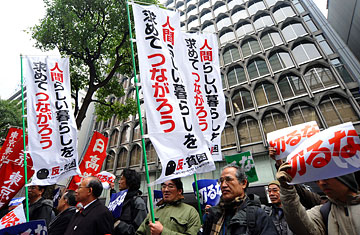
Labor union members gather in front of the Japan Federation of Economic Organizations building in Tokyo on Feb. 25, 2009, carrying signs that read "Do not lay off" to protest increasing layoffs of contract workers
In a nation where a Japanese salaryman could count on lifetime employment as much as he could a bowl of rice with his evening meal, representatives of government, business and labor are rushing to staunch massive job losses as Japan's export-driven economy reels.
Earlier this week Prime Minister Taro Aso forged an agreement with the Japan Business Federation (Nippon Keidanren) and the Japanese Trade Union Confederation (RENGO) to promote a range of measures companies could take — including reduced overtime, wage reductions and job transfers — to minimize layoffs. Meanwhile, the Ministry of Health, Labor and Welfare announced a subsidy scheme starting March 30 to help companies maintain their rosters of full-time, contract and temporary workers. (Read "Sony's Woes: Japan's Iconic Brands Under Fire.")
The global recession is hitting Japan, which depends heavily upon exports for growth, harder than any other developed economy. Trade figures released March 25 showed Japanese exports fell nearly 50% in February from the same month in 2008, the worst performance since Japan began keeping such statistics in 1980. Imports fell 43%, reflecting waning domestic demand.
Some of Japan's largest companies have been forced to lay off tens of thousands of temporary and contract workers over the last several months. Japan's unemployment rate for January was 4.1%, down from 4.4% in December, but economists warn the number of jobless could resume rising as the potential for layoffs at smaller companies are increasing. About 77% of unemployed Japanese, some 2.1 million people, don't receive unemployment insurance, according to a recent report from the United Nations International Labor Organization. In the U.S., 57% of workers are not covered by unemployment insurance, while in Germany only 13% of the unemployed receive no government assistance.
To quell Japanese workers' growing anxiety over job security, Aso, Nippon Keidanren and RENGO are pushing a program that has been in place since 2002 aimed at stabilizing employment levels. A key element of the plan is the provision of government subsidies to companies that have maintained an employment rate of more than 80% of their average headcount over the last six months. Subsidies for small- and medium-sized firms amount to annual lump-sum payments of about $3,050 for every full-time factory worker and contract employee kept on the payroll, and about $4,050 for every temporary worker. Large companies can receive about $2,000 for full-time and contract workers and $3,050 for temps. The subsidies are limited to 100 contract workers and 100 temp workers per company. When asked what industries will benefit the most under the plan, a RENGO spokesman said "All of them will."
Government, business and labor leaders also agreed to work toward creating more jobs in critical fields such as healthcare. On Thursday, Japan's major political parties proposed a 7% increase in nurses' salaries, which translates to an additional $410 a month for each nurse. If lawmakers approve, the increases would be paid for by the government at a total cost of $4.1 billion in the first year.
Japan's hard-hit automakers are already taking drastic steps to slash expenses while trying to preserve jobs. To reduce labor costs by 20% in its 2009 fiscal year, Nissan rolled out a program of reduced work hours, unpaid leave and provisions that allow factory workers and those in administrative positions to take second jobs outside the company. In April, Toyota plants in the U.S., the U.K. and Poland will impose 10% pay cuts across the board in conjunction with a blanket 10% reduction in work hours, according to Toyota Motors spokesman Paul Nolasco. Toyota temporarily closed some of its Japanese factories for 11 days in February and March.
Japanese lawmakers are expected to approve the nation's fiscal year 2009 budget on March 27, paving the way for the government to create a fresh economic stimulus package worth up to $203 billion — significantly more than the roughly $122 billion in spending authorized in two previous stimulus plans. Kaoru Yosano, Japan's economy minister, finance minister and head of the Financial Services Agency, has said he wants to have the latest stimulus package outlined ahead of next week's G-20 summit in London.
